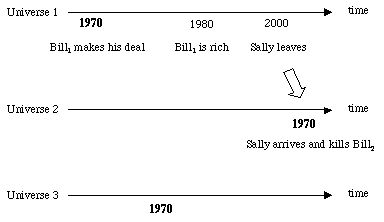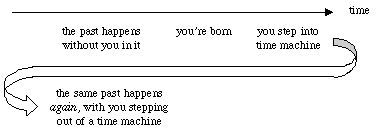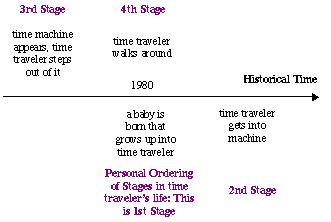It's 1970. Bill starts out poor, but he's very savvy in business, so he is able to amass a fortune and build a huge business empire. His cut-throat tactics make many of his competitors, like Scott, miserable. In 2000 Scott dies a broken man. Scott's sister Sally hates Bill because of this. She's a brilliant scientist, so she builds a time machine and uses it to travel back to 1970. Sally steps out of the time machine and encounters Bill on the way to make his first business deal. Then she kills him, before he ever becomes rich.The way this story tells things, 1970 unfolds twice. The first time, Bill makes his deal and gets rich. The second time, Sally kills Bill and the deal never takes place.
If we think of 1970 as a particular moment in time: 
then that story doesn't really make sense. How can a particular moment in time change? That would require it to first happen one way, and then happen again, a different way. In other words, at one time, 1970 is one way, but then at a later time 1970 is a different way. How could that be?
Some claims can change from being true to being false. For instance, claims of the form "Now it's snowing in Boston" can be true at some times and false at others. But how can claims about what happened at a specific moment in time--claims like "1970 was a year without any snow"--how can such claims first be true and then later become false? Would it make any sense if someone said:
- In 1980, 1970 had no snow.
- Then in 2000, 1970 did have snow.
That would be like saying:
- In NY, it's raining in Boston.
- In Baltimore, it's not raining in Boston.
That makes no sense. Boston is a particular location--either it's raining there or it isn't. It's can't be raining in Boston in one city, but not be raining in Boston in another city. (They might think in NY that it's raining in Boston; and think in Baltimore that it's not raining in Boston. But that's a different matter. We want to know whether it could really be raining in Boston in NY but not raining in Boston in Baltimore. And that doesn't seem to make any sense.)
Now, this makes sense:
- In NY, it's raining at City Hall.
- In Baltimore, it's not raining at City Hall.
That makes sense because "City Hall" doesn't name some one particular location. It names a bunch of different locations, that you can find in different cities.
Similarly, this makes sense:
- In 1980, December had no snow.
- In 2000, December did have snow.
That makes sense because "December" is like "City Hall": it doesn't name one particular moment in time. It names a bunch of different stretches of time, that occur in different years.
Well, what if "1970" were ike that? What if "1970" didn't name one particular location in spacetime, but instead named a bunch of different locations in spacetime?
One way to get that would be if we have a bunch of parallel universes:

Here "1970" doesn't name a particular moment in time. It names a bunch of different moments, that occur in different parallel universes.
Well, that's a logically possible way the world might be. There need be no logical contradictions in a story that says that Sally builds a box that enables her to travel from Universe 1 to Universe 2, and that when she's in Universe 2 she kills a guy who looks and talks like the guy who made her brother's life so miserable, back in Universe 1. But this wouldn't be time travel. Sally wouldn't be travelling back and preventing her brother's death. Her brother will still be just as dead, back in Universe 1. The guy Bill1 who's responsible for her brother's death will still be living the high life, back in Universe 1. Her actions in Universe 2 won't bring any harm to that guy. (Well, you could tell the story in such a way that when Sally uses her box to leave Universe 1, that sets off a big explosion that completely destroys Universe 1. So then nobody will be left behind. But in that case, it would be Sally's use of her box to travel that killed Bill1. Her actions in Universe 2 would still be irrelevant.)
The guy Sally does kill--Bill2--would be a different person, who (so far) hasn't done anybody any harm. It may be that he would have done people harm. It may be that there's a guy in Universe 2 who looks like Sally's brother Scott, and that killing Bill2 makes this guy a lot happier. But Scott himself will still be dead, back in Universe 1. Nothing Sally does in Universe 2 can bring him back to life, or save him from the misery and death he's already undergone. Sally can't prevent any of those things from happening. She's just travelled to a place where she may be reminded of them less. (In Universe 2, there's no grave marked "Scott," there's a guy who looks like Scott who's happy and successful, and so on.) But if all Sally wanted was just to have fewer reminders of Scott's death, she might have accomplished that much more readily--by taking a Caribbean cruise, for instance!
To really have a case where someone goes back in time and changes the past, there would have to be some particular moment in time that first happens one way, and then happens again, a second time, differently. That's what we can't really make any sense of. If the moment happens twice, then it can't really be a particular moment in time. So any story where someone goes back in time and changes the past is either:
- logically inconsistent, or
- not really a case of time travel, but rather a case of going to another universe, which looks a lot like ours, but the events there "lag" a few years behind the events in our universe

The appropriate picture is this: there was only one 1901, and you were either there or you weren't there. If you weren't there, then no time machine will (or did) ever take you there. If, on the other hand, you were there, it would look like this:

Suppose you're a director shooting a movie. You don't begin by filming the first scene of the movie and end by filming the last scene of the movie. Often it will be more convenient to film scenes out of sequence. After all the filming is done, you will then have a lot of film clips sitting on your desk. You can order those film clips in two different ways: you can order them with the scene you shot first at the beginning, and the scene you shot last at the end. Or you can order them with the scene that will go first in the movie at the beginning, and the scene that will go last in the movie at the end. These are equally legitimate ways to order the film clips.
We can carry this analogy over to the case of the time traveler.
One the one hand, we can order the events in his life according to how much time has passed on the calendar, when those events take place. Call this the historical ordering of events in the time traveler's life. If a time traveler from 2000 goes back to the early 20th century and dies there, then his death will come before his birth, in the historical ordering of events in his life. Back in the early 20th century, the time traveler may "remember" doing certain things in 2000. If so, then the "memory" will come before the remembered event, in the historical ordering.
On the other hand, we can order the events in the time traveler's life by the "aging processes" in the time traveler's body and in his mental life. Call this the personal ordering of events in the time traveler's life. A time traveler's death will always come after his birth, in the personal ordering of events in his life--even if his death occurred in calendar year 1901, and his birth occurred in calendar year 1980. And in the personal ordering, "memories" always come after the remembered event.
Given these two ways of ordering events in the time traveler's life, we can begin to make sense of his claim that "Five minutes from now, I will be 100 years in the past." What the time traveler means by this is that the period in his life which comes next in the personal ordering of events in his life has already occurred--100 years in the past--by the historical ordering of events.

Here there is no contradiction. It's just as if the director were to say, after completing filming of one scene, "Okay, we already shot the next scene 100 days ago." What he means is that the scene which will come next in the movie was shot 100 days ago, by the calendar.
In this way, we can also make sense of puzzles like a time traveler being in two places at one (historical) time. For instance, in the following diagram, the time traveler is at two places in 1980. Notice, though, that the time traveler only occupies one place at each moment in the personal ordering of the stages of his life. For example, the first stage of his life does not occupy two places at the same time. It only occupies a single place. It's just that the 1st stage occupies a place in the historical year 1980, and the 4th stage of his life also occupies a place (a different place) in that same historical year.

If you do time travel, then the events in 1901 come before the events of 2000 in the historical ordering of events in your life; but they come after the events of 2000 in the personal ordering of events in your life.